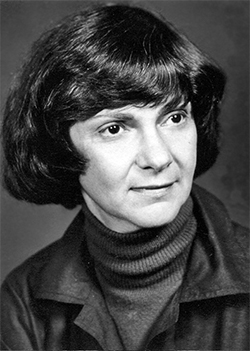 Women’s Historian and Women’s Studies Director
Women’s Historian and Women’s Studies Director
For Ann Lane, the women’s movement of the 1960s and ’70s provided a new professional agenda as well as a cause, as it did for many academic women of her generation. Attracted earlier to Marxism as a tool for analyzing American society, she found in feminism an illuminating perspective on the gender inequities experienced by many women for which they as yet had no name, let alone an analytic framework. With characteristic energy and determination, she devoted the rest of her professional life to implementing the insights of feminism, as both a scholar of women’s history and a dynamic director of women’s studies programs. For Lane, theory and practice were one.
Ann J. Lane was born in Brooklyn in 1931, the daughter of Harry and Betty Brown Lane. She earned a BA in English from Brooklyn College in 1952, an MA in sociology from New York University in 1958, and in 1968 a PhD in history from Columbia University, where her dissertation defense took place amid the student sit-ins then roiling the campus.
Lane began as a specialist in southern and African American history, the fruits of which appeared in two works published in 1971, The Brownsville Affair: National Crisis and Black Reaction, a monograph on a racial incident in Texas involving black soldiers and white citizens in 1906, and The Debate Over Slavery: Stanley Elkins and His Critics, an edited work that included her introduction on a then-raging historiographical controversy.
She quickly emerged as a feminist activist and pioneer in women’s history. Already noted for her cogent intellect and sharp wit, she was recruited at the first national meeting of the Berkshire Conference of Women Historians in 1973 to debate Lionel Tiger, an anthropologist who had recently highlighted the biological basis of social interactions. Elegantly attired, Lane electrified the audience with her trenchant critique of sociobiology.
Lane’s most notable scholarly contributions were to the study of feminist theory and women’s biography. In the mid-1970s, she turned her attention to the roots of women’s history and feminist theory in her work on two writers who placed women at the center of their historical inquiries. Mary Ritter Beard and Charlotte Perkins Gilman held divergent interpretations of women’s past, the former emphasizing their achievements, the latter their subordination, but Lane provided cogent and sympathetic analyses of both. In Mary Ritter Beard: A Sourcebook (1977), she made a compelling case for the importance of Beard’s historical and theoretical work in reconstructing women as significant historical agents, insights that anticipated those of a later generation of scholars.
Lane will be best remembered for her work on Charlotte Perkins Gilman. Her recovery of Gilman’s 1915 feminist utopian fiction, Herland (reprinted in book form for the first time in 1979), followed by The Charlotte Perkins Gilman Reader the next year, helped direct the attention of literary scholars as well as historians to this neglected feminist writer. Her work culminated in To Herland and Beyond: The Life and Work of Charlotte Perkins Gilman (1990), an innovative biography organized around Gilman’s often fraught relationships with family and friends. By drawing on one of the fundamental insights of second-wave feminism—that the personal is political—Lane was able to demonstrate the ways in which Gilman’s theoretical insights grew out of her life. An engaging and “masterful biography” in one reviewer’s view, the book struck a responsive chord with many readers, including undergraduates, who read it with enthusiasm.
Lane’s interest in advancing women’s careers as well as understanding their past made her an ideal women’s studies director. After teaching at Douglass College (Rutgers University) and John Jay College of Criminal Justice (CUNY), she went on to build exciting women’s studies programs at two formerly all-male institutions, Colgate University (1983–1990) and the University of Virginia (1990–2003), where the sympathetic dean who hired her told her “to make trouble.”
At both institutions, Lane built communities of scholars and nurtured the careers of young women faculty who looked to her for support in sometimes hostile environments. She also promoted more equitable gender arrangements, such as maternity leaves, as well as stricter policies against sexual harassment. “Ann transformed the place,” a Colgate faculty member recalled.“[She] was a force in faculty meetings; always direct; she changed the very form of those events. She mattered to any number of us and was a presence, as few people are.” And a former colleague at the University of Virginia observed, “She was the place women went if they had a problem.”
Perhaps the word that best describes Lane is “fearless.” As an outspoken advocate, she could be “a thorn in the side of conservative anti-feminists.” When she thought a person had been treated unfairly or considered a policy wrongheaded, she spared no effort to redress the situation, marching into administrators’ offices, speaking at faculty meetings, and devising strategies for change. But however fierce in argument, she was vitally interested in the people around her and gracious even to those with whom she differed. She was a generous friend and fun to be with.
Lane retired in 2009. In her last years, she worked on a cultural history of consensual sexual relationships between professors and their students, an outgrowth of her interest in stricter regulation of what she considered “the academy’s dirty little secret.” She did not live to complete the project, but a deeply-felt 1998 article in Academe signaled her disapproval of such relations because of the troubling power differentials between professors and students and the negative impact on other students as well.
Ann Lane was married twice, first to historian Eugene Genovese, then to labor leader William Haywood Nuchow. She died on May 27, 2013, and is survived by her brother, civil rights attorney Mark Lane, her daughters, Leslie Nuchow and Joni Lane, three grandchildren, and her companion Wayne Roberts.
Barbara Sicherman
Trinity College (emerita)
Tags: In Memoriam Women, Gender, Sexuality
Comment
Please read our commenting and letters policy before submitting.






